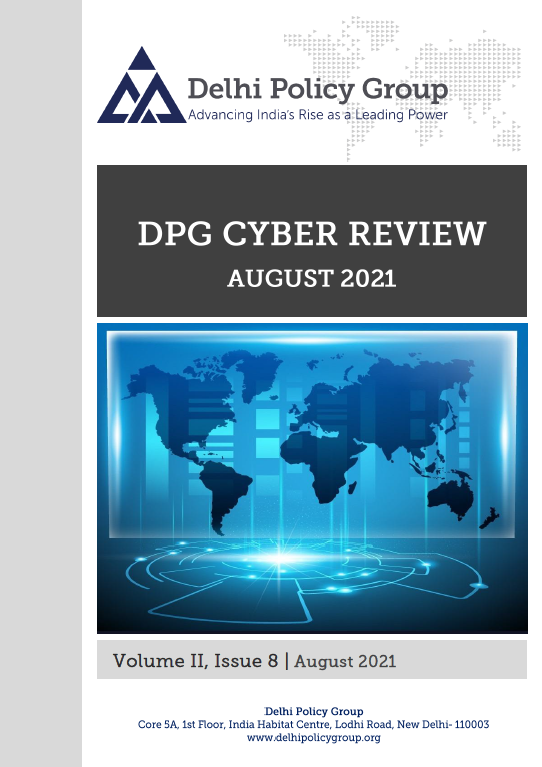Vol. II, Issue 8
Date: September 02, 2021
The past month has witnessed criminal attacks on Indian cyberspace targeting schools, universities, research centres and financial portals. Pakistan state agencies are reported to be targeting Indian cyberspace with mutated malware. To meet these challenges, the National Security Council Secretariat (NSCS) and the Ministry of Home Affairs have taken measures to enhance India’s cybersecurity posture and prevent cyberattacks.
The government has announced liberalised ‘Drone Rules 2021,’ adopting a proactive regulatory approach to make India a global drone hub by 2030. The country’s first ‘Quantum Computer Simulator (QSim) Toolkit’, a collaborative effort of academia and industry and funded by the government, was launched this month to develop skills of quantum computing linked technologies. A similar collaborative effort is being seen in the semiconductor sector for developing memory technology.
On the international front, ransomware attacks continue to dominate cyberspace. Safeguarding customer information has become a challenge for telecom service providers. Data on some 47 million customers of the US telecommunications company T-Mobile was reportedly stolen. In Japan, the crypto currency exchange Liquid has been targeted, resulting in a loss of $97 million in various crypto-currencies.
To meet continuing cyber threats across sectors, the US plans to allocate $2 billion from the $1.2 trillion infrastructure bill to improve cybersecurity capabilities. US private sector technology companies have also pledged large investments, as part of joint initiatives to boost the nation’s cyber security. Meanwhile, China continues to expand strict regulatory measures on digital companies, including through a Personal Information Protection Law and a Data Security Law which be effective from November 1 and September 1 respectively.
The National Security Advisers of the BRICS and IBSA countries held separate meetings during the month to review emerging threats to national security and strengthen cooperation on cyber security.
The government has announced liberalised ‘Drone Rules 2021,’ adopting a proactive regulatory approach to make India a global drone hub by 2030. The country’s first ‘Quantum Computer Simulator (QSim) Toolkit’, a collaborative effort of academia and industry and funded by the government, was launched this month to develop skills of quantum computing linked technologies. A similar collaborative effort is being seen in the semiconductor sector for developing memory technology.
On the international front, ransomware attacks continue to dominate cyberspace. Safeguarding customer information has become a challenge for telecom service providers. Data on some 47 million customers of the US telecommunications company T-Mobile was reportedly stolen. In Japan, the crypto currency exchange Liquid has been targeted, resulting in a loss of $97 million in various crypto-currencies.
To meet continuing cyber threats across sectors, the US plans to allocate $2 billion from the $1.2 trillion infrastructure bill to improve cybersecurity capabilities. US private sector technology companies have also pledged large investments, as part of joint initiatives to boost the nation’s cyber security. Meanwhile, China continues to expand strict regulatory measures on digital companies, including through a Personal Information Protection Law and a Data Security Law which be effective from November 1 and September 1 respectively.
The National Security Advisers of the BRICS and IBSA countries held separate meetings during the month to review emerging threats to national security and strengthen cooperation on cyber security.



